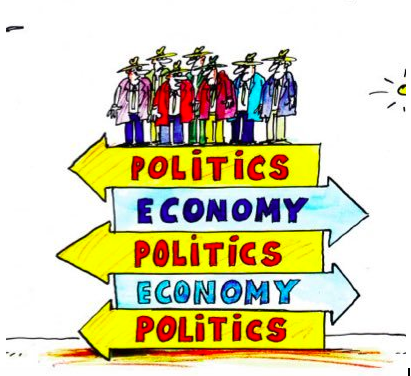
VATSAL BAJAJ – NOVEMBER 1ST, 2018
Since the times of the barter economy, economics has been the language of political discourse. Governments widely employ economic policy to indirectly communicate with other nation-states and express ‘feelings’ of affinity or hostility. Whether it’s economic sanctions against North Korea or opening up trade with Russia in the 1990s in response to the end of the Cold War, the US has employed economic policies to relay messages. These messages motivate decisions made on an international scale and determine the current balance of power through passive aggressive means.
Dr. George Simon, a renowned psychologist, defines passive aggression as “deliberate, active, but carefully veiled hostile acts of resistance.”[1] If we apply this individualistic definition to nation-states, economic policies which attempt at influencing other nations can be considered forms of passive aggressiveness. Since the start of the nuclear age, all-out war is no longer an option to resolve disputes because of Mutually Assured Destruction (M.A.D.), a term popularized by Robert McNamara, the Secretary of Defense under President John F. Kennedy. The concept of M.A.D. illustrates the idea that an all-out war in the nuclear age will lead to destruction of all parties involved. In such a scenario, nations tend to convey hostility through “deliberate, active, but carefully veiled hostile acts of resistance.” In simple terms, if any country starts a war, there would be a substantial chance of it being destroyed as the opponent country would respond in equal measure. Here, it is in the country’s best interest to avoid total aggression.
One such example of using economics to shift the balance of power are the economic sanctions against North Korea. The tough sanctions imposed on North Korea “to stop its nuclear weapons and missile programs have begun to bite, and bite hard” says Chose Sang-Hu in his New York Times article, “Sanctions are hurting the North. Can they make Kim give in?” Defectors and recent visitors who inform that even though there is no immediate risk of famine, “factories have closed because of a lack of raw materials, fishermen have deserted their boats and military units are resorting to charcoal-engine vehicles and even ox-driven carts for transport.” Sang- Hu infers that this forced Kim Jong Un to the bargaining table, leading to the historic June 12 summit between the two presidents. These sanctions have been a core part of the “maximum pressure” the US and its allies have been applying to force concessions on North Korea’s nuclear-weapons program. In fact, President Donald Trump said sanctions will be maintained until North Korea’s nuclear program is “no longer a problem.” Even though the summit hints at a thaw in US- North Korea relations, the sanctions remain as a condemnation of North Korea’s nuclearization.
There are also examples from history, such as the Marshall Plan, when countries communicated with economic policies. The Marshall Plan, officially known as the European Recovery Program, was a program that provided economic aid of over $13 billion to European nations affected by World War 2. It signaled a drastic change in US foreign policy from that of isolationism before WWII to one of direct foreign interference to ‘contain’ communism. The Soviets called it “dollar imperialism,” as they claimed that the US was trying to make European states dependent on the US. Russian politician, GM Malenkov went on to critique that “the ruling gang of American imperialists has taken the path of open expansion, of enslaving weakened capitalist countries.” The US defended itself claiming that the policy wasn’t directed against any country, but against “hunger, poverty, desperation and chaos.” The Soviets responded with the Molotov Plan which helped rebuilding Eastern European countries that were politically and economically aligned to the USSR.
Both of these examples show how economics has been used as a language to convey passive aggressiveness. Economic sanctions against North Korea brought Kim Jong Un to the bargaining table and forced them to communicate with the West. Similarly, the Marshall Plan got an economic response from the Soviets. In today’s world where globalization is dominant and M.A.D has made direct aggression a less likely response, economics has come to the forefront of political discourse.
Featured Image Source: https://twitter.com/jlpoliticalecon
Disclaimer: The views published in this journal are those of the individual authors or speakers and do not necessarily reflect the position or policy of The Berkeley Economic Review staff, the Undergraduate Economics Association, the UC Berkeley Economics Department and faculty, or the University of California at Berkeley in general.




Thanks a lot.As am a political science student…it helps me a lot. Even I can’t define how much I needed it. No words for ur help…